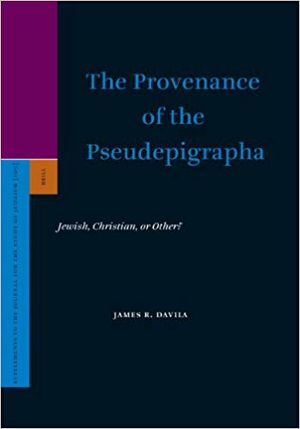The Provenance of the Pseudepigrapha (2005 Davila), book
The Provenance of the Pseudepigrapha: Jewish, Christian, or Other? (2005) is a book by James R. Davila.
Abstract
Provided that the OT Pseudepigrapha were transmitted by Christians, Davila explores the methodological criteria for distinguishing between Jewish and Christian authorship. Davila concludes that it is possible to demonstrate that some works (notably, the Letter of Aristeas, the Parables of Enoch, 2 Baruch, and 4 Ezra) were indeed Jewish, while in other cases their origin is dubious or debatable.
"The Old Testament pseudepigrapha are ancient quasi-biblical texts inspired by the Hebrew Bible. Although frequently mined as Jewish background by New Testament specialists, they were transmitted almost entirely in Christian circles, often only in translation. Christian authors wrote some pseudepigrapha and did not necessarily always mention explicitly Christian topics. This book challenges the assumption that pseudepigrapha are Jewish compositions until proven otherwise. It proposes a methodology for understanding them first in the social context of their earliest manuscripts, inferring still earlier origins only as required by positive evidence while considering the full range of possible authors (Jews, Christians, "God-fearers," Samaritans, etc.). It analyzes a substantial corpus of pseudepigrapha, distinguishing those that are probably Jewish from those of more doubtful origins."--Publisher description.
Editions
Published in Leiden: Brill, 2005 (Supplements to the Journal for the Study of Judaism, 105).
Contents
- Introduction: Establishing the Origins of Old Testament Pseudepigrapha
- 1. Jewish Pseudepigrapha and Christian Apocrypha: (How) can we tell them apart?
- 2. Did Christians write Old Testament Pseudepigrapha that appear to be Jewish?
- 3. Jewish Pseudepigrapha
- Excursus: Observations on Philo and Josephus
- 4. Some Pseudepigrapha of debatable origins
- Excursus: Observations on the Old Testament Apocrypha
- Conclusions
